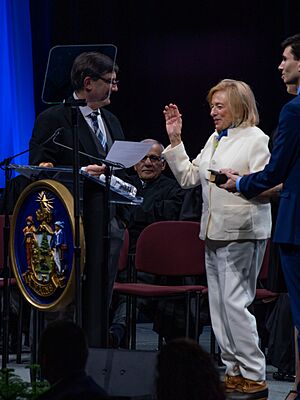Janet Mills facts for kids
Quick facts for kids
Janet Mills
|
|
|---|---|

Mills in 2019
|
|
| 75th Governor of Maine | |
| Assumed office January 2, 2019 |
|
| Preceded by | Paul LePage |
| 55th and 57th Attorney General of Maine | |
| In office January 7, 2013 – January 2, 2019 |
|
| Governor | Paul LePage |
| Preceded by | William Schneider |
| Succeeded by | Aaron Frey |
| In office January 6, 2009 – January 6, 2011 |
|
| Governor | John Baldacci |
| Preceded by | Steven Rowe |
| Succeeded by | William Schneider |
| Member of the Maine House of Representatives | |
| In office December 4, 2002 – January 6, 2009 |
|
| Preceded by | Walter Gooley |
| Succeeded by | Lance Harvell |
| Constituency | 78th district (2002–2004) 89th district (2004–2009) |
| District Attorney of Androscoggin, Franklin, and Oxford Counties | |
| In office 1980 – January 1995 |
|
| Appointed by | Joseph E. Brennan |
| Preceded by | Thomas E. Delahanty II |
| Succeeded by | Norman Croteau |
| Personal details | |
| Born |
Janet Trafton Mills
December 30, 1947 Farmington, Maine, U.S. |
| Political party | Democratic |
| Spouse |
Stanley Kuklinski
(m. 1985; died 2014) |
| Relatives | S. Peter Mills Jr. (father) Peter Mills (brother) |
| Education | Colby College University of Massachusetts, Boston (BA) University of Maine (JD) |
Janet Trafton Mills (born December 30, 1947) is an American politician and lawyer. Since 2019, she has served as the 75th governor of Maine. A governor is the leader of a state's government. Before becoming governor, Mills was the Attorney General of Maine.
Mills is a member of the Democratic Party. She was the first woman to be Attorney General of Maine and the first woman to be governor of Maine. She won the election for governor in 2018 and was reelected in 2022.
Contents
Early Life and School
Janet Mills was born in Farmington, Maine, on December 30, 1947. Her mother, Katherine, was a schoolteacher, and her father, S. Peter Mills Jr., was a lawyer.
As a teenager, Mills had a serious back condition called scoliosis. She had to spend almost a year in bed wearing a full-body cast before surgery corrected it. She graduated from Farmington High School in 1965.
After high school, Mills attended Colby College for a short time. She then moved to San Francisco and worked in a hospital. Later, she went to the University of Massachusetts Boston and earned a degree in 1970. While in college, she traveled in Europe and learned to speak French. In 1976, she graduated from the University of Maine School of Law with a law degree.
Early Career in Law and Politics
From 1976 to 1980, Mills worked as an assistant attorney general. This is a lawyer who works for the state government. She was the first woman in Maine to be a criminal prosecutor.
In 1980, she was elected district attorney for three counties in Maine. A district attorney is a lawyer who represents the government in court. She was the first woman to hold this job in all of New England. She was reelected three times.
In 1994, Mills ran for a seat in the United States Congress but did not win the primary election. In 2002, she was elected to the Maine House of Representatives, which is part of Maine's state government. She served on committees that dealt with laws and the state's budget.
Attorney General of Maine
In 2009, Mills was chosen to be Maine's Attorney General. The Attorney General is the top lawyer for the state. When the Republican Party gained control of the Maine legislature in 2010, she was not reelected.
However, after the Democratic Party regained control in 2012, Mills was chosen as Attorney General again. She was reelected in 2014.
During her time as Attorney General, Mills sometimes disagreed with Republican Governor Paul LePage about certain policies. They had disputes over whether some of the governor's actions were legal.
Governor of Maine
Elections
2018 Election
In 2017, Mills announced she would run for governor of Maine. She won the Democratic Party's nomination. In the main election, she faced Republican Shawn Moody and independent candidate Terry Hayes.
Mills won the election with over 50% of the vote. She became Maine's first female governor. She also received more votes than any governor in the state's history at that time.
2022 Election
Mills ran for reelection in 2022. She ran against former governor Paul LePage. Mills won the election and began her second term. She broke her own record for the most votes ever received by a candidate for governor in Maine.
Work as Governor
One of the first things Mills did as governor was to expand Maine's Medicaid program. Medicaid is a government program that helps people with low incomes get health care. Voters had approved this expansion in 2017, but the previous governor had not put it into action.
Mills also brought back the tradition of governors attending events for Martin Luther King Jr. Day.
In September 2019, Mills was invited to speak at the United Nations about climate change. She told world leaders that she planned for Maine to be carbon neutral by 2045. This means the state would not add any new carbon dioxide to the atmosphere. She was the first sitting governor of Maine to speak to the UN General Assembly.
On April 20, 2022, Mills signed a state budget that made community college free for students who graduated high school from 2020 to 2023.
Political Positions
Mills is known as a moderate Democrat. This means she sometimes agrees with ideas from both the Democratic and Republican parties.
Environment
Mills has passed laws to protect the environment. One law banned single-use plastic bags in stores. Another law banned the use of styrofoam food containers.
She has also supported projects for clean energy. In 2023, she was chosen as a co-chair of the U.S. Climate Alliance, a group of governors working to fight climate change.
LGBT Rights
Mills supports rights for LGBT people. In 2019, she signed a bill to ban the practice of conversion therapy for minors. This is a harmful practice that tries to change a person's sexual orientation or gender identity.
In 2021, she officially declared June to be LGBTQ+ Pride Month in Maine. She also supports the right of transgender athletes to play on sports teams that match their gender identity.
Tribal Relations
Mills has worked to improve the relationship between the state government and Maine's Native American tribes. She signed a bill to change the Columbus Day holiday to Indigenous People's Day.
She also signed a law to ban the use of Native American mascots in public schools. This was done because many Native Americans found the mascots to be hurtful.
Personal Life
In 1985, Mills married Stanley Kuklinski, who had five daughters. Kuklinski passed away in 2014. Mills's brother, Peter Mills, is a former Republican state senator who also ran for governor.
Mills lives in her hometown of Farmington, Maine. As governor, she also lives in the Blaine House, the official home for Maine's governor in Augusta.
Electoral History
| Party | Candidate | Votes | % | |
|---|---|---|---|---|
| Democratic | Janet Mills | 320,962 | 50.9 | |
| Republican | Shawn Moody | 272,311 | 43.2 | |
| Independent | Terry Hayes | 37,268 | 5.9 | |
| Party | Candidate | Votes | % | |
|---|---|---|---|---|
| Democratic | Janet Mills (incumbent) | 74,311 | 100 | |
| Party | Candidate | Votes | % | |
|---|---|---|---|---|
| Democratic | Janet Mills (incumbent) | 376,934 | 55.7 | |
| Republican | Paul LePage | 287,304 | 42.4 | |
| Independent | Sam Hunkler | 12,581 | 1.9 | |
See also
 In Spanish: Janet Mills para niños
In Spanish: Janet Mills para niños
- List of female governors in the United States
- List of female state attorneys general in the United States
 | Sharif Bey |
 | Hale Woodruff |
 | Richmond Barthé |
 | Purvis Young |



